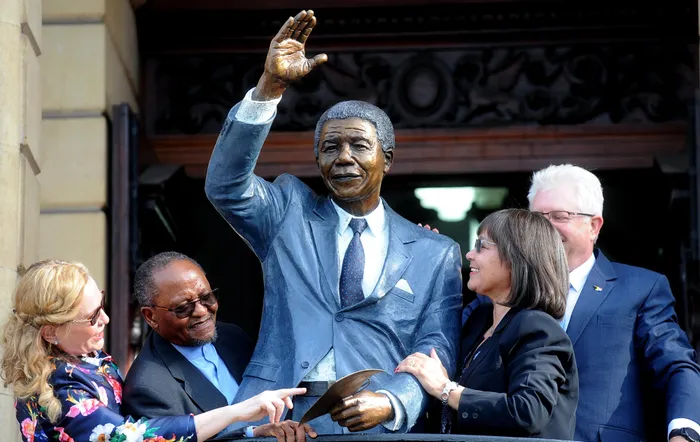Nelson Mandela Foundation launches special online archives of his legacy on 32nd anniversary of his release

A statue of former President Nelson Mandela at the Cape Town City Hall where he made his first speech upon his release from prison. Picture: Ayanda Ndamane (African News Agency (ANA) Archives
Durban - The Nelson Mandela Foundation has used the 32nd anniversary of the release from prison of the late first democratically elected President of South Africa to launch a special online archive portal at the Centre of Memory.
The Centre of Memory was formed in 2004 and Mandela had handed over numerous of his possessions to the centre for archiving.
In a television interview Raziah Saleh, the Nelson Mandela Foundation director of Archives and Research, said that the archives included the transcript of Madiba’s first ever speech made at the Cape Town City Hall on the day of his release on February 11, 1990, and a document listing all of the possessions that the former head of state had with him when he left prison.
“It’s an inventory in Afrikaans of the various things he had with him, a surfboard, exercising weights and various other items,” Saleh said.
She said that the surfboard was due to the house that Madiba spent the last 14 months of his sentence in, on the grounds of the Victor Verster Prison, having a swimming pool and Mandela wanting to use it to swim.
Saleh said that the idea of the Centre of Memory had dawned upon them around the start of the Fees Must Fall campaign when there was talking of Mandela being a sellout and having done a deal with the apartheid government.
“When we engaged with those student leaders they were quite surprised to learn all of the things that we had to show and tell about Madiba and a few of them did change their mind after their engagement with us that Madiba was not a sellout and that it was in part due to him that we have the freedoms that we have today.
“We think that Madiba’s legacy has a lot of resonance, it’s quite important to understand it, analyse it, discuss it, especially with the born frees, the people who were born post apartheid,” Saleh said.
She said that the earliest record of Madiba in the archives was his Methodist Church membership card, but they unfortunately did not have early photographs of the former head of state.
“The earliest photograph that we have of him is at Healdtown, the high school that he attended in 1937 and 1938 and the photo is from 1938, a classroom photo and one of his whole class and another of his entire grade and he’s one of many people in those photos,” Saleh said.
She said that for the period that Mandela was imprisoned they had a limited amount of material such as his prison notebooks, two notebooks of his prison letters from 1969 to 1971.
samkelo.mtshali@inl.co.za
Political Bureau
Related Topics: